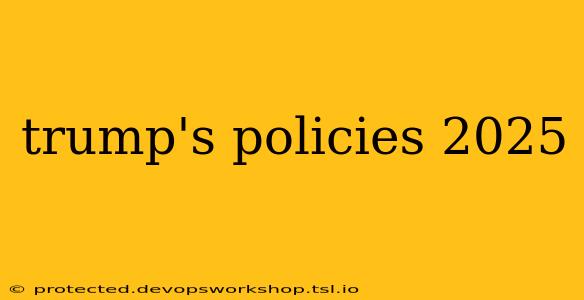Donald Trump's potential policy platform for a potential 2025 presidential run remains largely undefined, but based on his past pronouncements, actions during his 2017-2021 presidency, and current political climate, we can speculate on key areas and potential shifts. This analysis does not endorse any particular political stance but aims to offer an informed overview of plausible policy directions. Remember, this is speculative; official policy platforms will only emerge closer to a potential election.
Economic Policies: A Focus on American Businesses
Trump's economic policies in 2017-2021 focused heavily on deregulation, tax cuts (particularly for corporations), and protectionist trade measures (tariffs). A potential 2025 platform might continue these themes, potentially with refinements:
Taxation: Further Cuts or Targeted Relief?
While significant corporate tax cuts were implemented in 2017, a 2025 platform might explore additional cuts or propose targeted tax relief for specific industries or income brackets. The exact details will depend on economic conditions and the political landscape at the time. We might see proposals aimed at incentivizing domestic manufacturing or investment.
Trade: Negotiation and Protectionism?
Trump's trade policies involved imposing tariffs on various goods imported from China and other countries. While he framed this as negotiation leverage, it resulted in trade wars and economic disruption. A 2025 platform might continue some form of protectionist trade measures, perhaps focusing on specific industries deemed vital to national security or economic strength. However, the approach might be more nuanced, prioritizing bilateral trade deals over broad, unilaterally imposed tariffs.
Deregulation: Continued Effort to Reduce Government Oversight
Deregulation was a central theme of the Trump administration. In 2025, this might continue, targeting areas like environmental regulations and financial regulations. The potential effects on environmental protection and consumer safeguards would remain a key point of debate.
Foreign Policy: "America First" with Nuances
Trump's "America First" approach prioritized unilateral action and challenged existing international alliances. This might remain a core principle, albeit potentially with some modifications:
International Alliances: Selective Engagement
While emphasizing national interests, a 2025 approach might involve more selective engagement with international allies and organizations. This could imply renegotiating existing agreements or prioritizing alliances deemed strategically vital, potentially at the expense of others.
China: Continued Confrontation or Strategic Reassessment?
China's economic and geopolitical rise was a key focus of Trump's foreign policy. In 2025, this might continue with a focus on trade imbalances, intellectual property theft, and national security concerns. However, the approach could range from continued confrontation to a more strategic reassessment of engagement, depending on evolving global dynamics.
Social and Domestic Policies: A Blend of Traditional and Populist Themes
Trump's domestic policies blended traditional conservative viewpoints with populist appeals. A 2025 platform could potentially include:
Immigration: Emphasis on Border Security
Stricter border security would likely remain a central focus. Specific policy proposals might vary, but expect to see continued emphasis on border wall construction, enhanced surveillance, and stricter immigration enforcement.
Healthcare: Potential for Market-Based Reforms
Trump's healthcare policy proposals were aimed at repealing and replacing the Affordable Care Act (ACA). While that failed, a 2025 platform might propose alternative market-based reforms focused on deregulation, increased competition, and potentially offering tax credits or subsidies to offset healthcare costs.
This analysis is speculative. The actual policy positions of a potential 2025 Trump candidacy would depend on various factors, including the political climate, the economy, and the advice he receives from his campaign team. It is crucial to critically evaluate all policy proposals from any political candidate with a thorough understanding of potential consequences.

